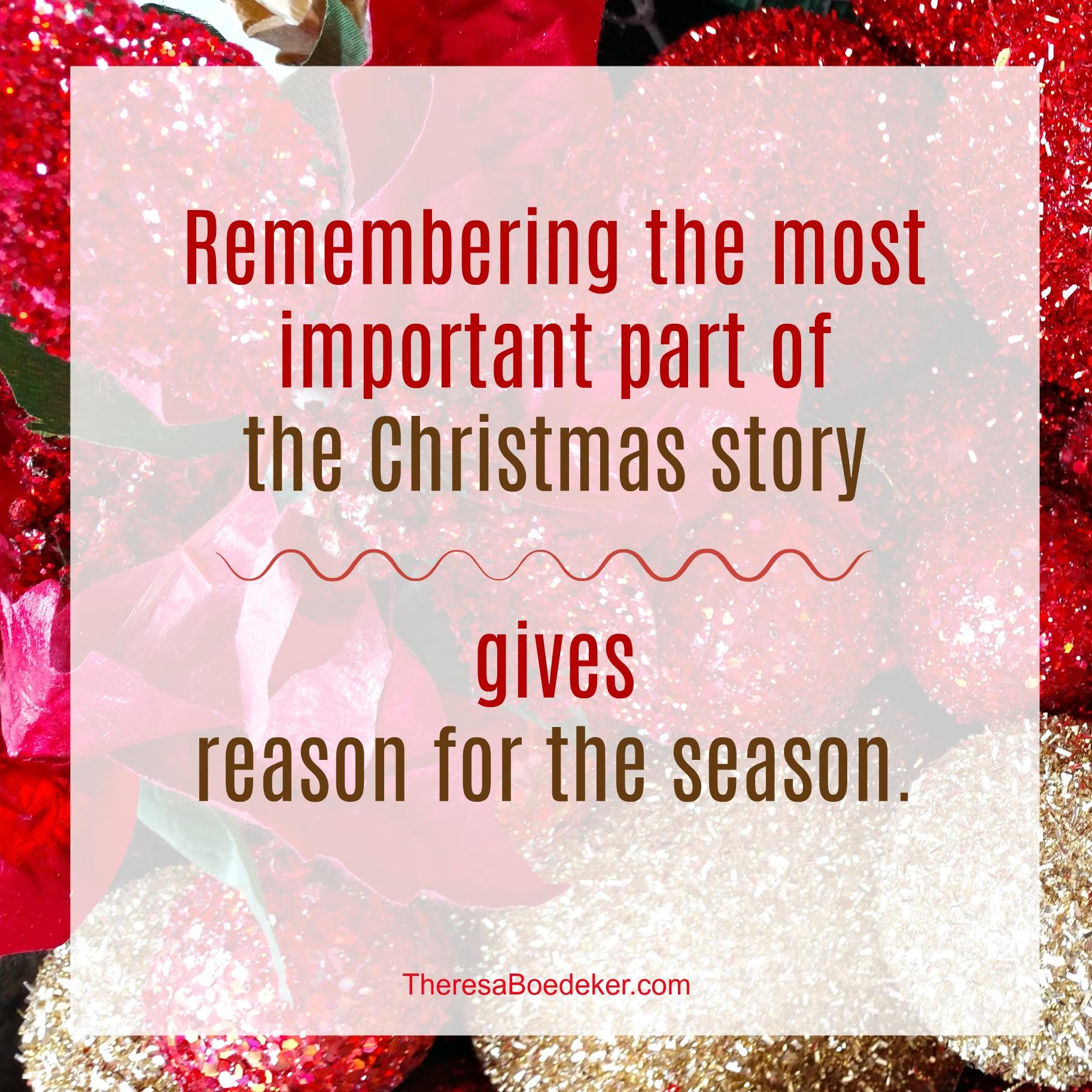Both Christmas and telling a joke need to focus on the most important part of the story. Otherwise they fall a little flat.
Nothing kills a joke faster than when you leave a key ingredient out of the story.
If you don’t set up the joke correctly, the punch line falls rather flat. Sometimes people don’t even know the joke is over.
Let’s pretend that you are getting ready to tell the punch line and you suddenly realize you forgot to tell the listeners an important fact. That the man in your story climbed a tree.
Without this detail, the punch line makes no sense.
“Oh no” you may tell the audience, “I forgot to tell you the man in the forest climbed a tree and is no longer on the ground.”
But now the whole joke is thrown off. And so are the listeners. They are trying to figure out why you left out this most important detail and how this fact effects the story.
You have also just alerted them to the surprise element of the story which ties into the punch line. Thereby diminishing the surprise element at the end.
Now when you then deliver the punch line, “Moo, ” well it doesn’t have much success. Even if you say “Moo” twice.
I know. I’ve told this joke and have forgotten to have the man climb the tree. And the punch line landed flatter than a pressed flower.
Forgetting the most important part of the joke, never has good results.
It leaves you and the listeners kinda empty and wanting more.



Jokes are not the only thing with an important ingredient.
The same is true for Christmas. If we forget the most important thing about Christmas (the reason for the season), the whole holiday is rather flat. It never really delivers like we want it to.
It doesn’t transport and impact us. Or those around us, who are leaning in trying to catch the importance of Christmas.
Without our eyes on the most important ingredient in Christmas, we wander through the holidays feeling a little empty. Wanting more. Wondering if this is it.
Let’s not leave out the key ingredient.

7 Ways Christmas and telling a joke are similar.
I know telling a joke and Christmas are two unlikely bedfellows, but they do have some things in common. Let’s look at some of those elements.
1. Telling a good joke takes practice, and so does Christmas.
You can’t tell a good joke without some practice. You listen to other jokes. Evaluate what makes them successful. What causes others to laugh. And then you practice telling jokes. Refining the punch line, switching up the order or wording, and rehearsing the delivery. The joke doesn’t need to be perfect to delight the audience, but it needs to have the key elements of the story and a punch line.
Christmas comes every year and we get to practice keeping and celebrating it over and over. And just like a joke, it may change and evolve over the years, but that’s alright, as long as it keeps the main ingredients. It doesn’t need to be perfect, but we want the key ingredient at the center. Jesus. Or else the season loses its focus.
2. There is no perfect joke. Just like there is no perfect Christmas.
Everyone tells a joke a little differently. Even the same joke. Because their personality and being come into telling the joke. Which means there is a lot of variety.
The same is true for Christmas. Everyone celebrates, prepares for, and keeps Christmas a little differently. And that is good. We don’t need to do it like our neighbors. There is no one and right way, but instead we can have variety.
3. While telling a joke, keep the punch line in mind. Likewise, keep the reason for celebrating Christmas, front and center.
Unless the punch line is front and center, we often forget a key ingredient to the story, or get to the end of the joke and pause way to long, trying to remember the wording of the last line.
Unless we keep remembering Jesus and how he ties into Christmas, this time can just become another season of busy and to-do lists. A season of frustration and complaining and feeling overwhelmed. But when we remember Jesus, our motivation changes. Our busy changes. Our reason changes. Hope, love, joy, and peace can be experienced.

 4. A well told joke does not always bring delight and joy to the audience. Sometimes it brings awareness, or a little sadness at seeing ourselves in a different way. Christmas is the same.
4. A well told joke does not always bring delight and joy to the audience. Sometimes it brings awareness, or a little sadness at seeing ourselves in a different way. Christmas is the same.
Jokes can touch on our insecurities, touch a sore nerve, or help us see ourselves in a new way.
Christmas is not always joy and happiness. It can remind us of hard times, people no longer here, and a loneliness and longing for family. And when we focus on why Jesus chose to come — to save people living in sin, bring hope to the hopeless, heal the hurts, light the darkness, minster to those in need, forgive and save – – we can experience sorrow and pain. Often Christmas is a combination of emotions. Sorrow and hope. Pain and happiness. Despair and love. Not enough and yet enough.
5. The good punch line of a joke often has an element of surprise, a touch of unusual, and so does Christmas.
We can be thinking a joke will end one way, and then it ends totally somewhere else.
The true story of Christmas is the same way. Especially if we are hearing it for the first time. It can be hard to wrap our thoughts around God coming to earth as a baby, not already a man. Being born in a manger, not in the comfort of a palace or at least high society. Heavenly angels announcing the birth to lowly shepherds, not the town’s society page or the town mayor. Nothing in the story is how we would plan his arrival if we were in charge. There is surprise after surprise.
6. Focus on telling the joke, or planning for Christmas, and let the audience receive the “end product” in their own way.
Remember you are the teller of the joke. The listeners will hear and respond to the joke in their own way. You can not control how they process or hear the joke, or what they think of the joke. You cannot get them to laugh, if they don’t want to. Do your part and leave them to do their part.
The same is true of Christmas. You plan and prepare and do your part. Then let others receive and process and enjoy Christmas in their own way. We can not control how others will act or think or feel. We can not put people into the Christmas spirit, make them enjoy making cookies, or force them to get excited about singing carols. Do your part, leave the rest to them (and God).
7. When telling a joke, remember your audience. People are listening and watching. Do the same with Christmas.
Before telling a joke, think about your audience. Change the chicken crossing the road antidote to a deer crossing the road when your audience are hunters.
When it comes to Christmas, remember that others are watching and listening. Let your conversations point to Jesus without being preachy. This may mean instead of complaining to others about all we need to do, we could instead talk about the blessing of Christmas. Or something we are working on this Christmas. Or what Christmas means to us.
Above all, we want others to see the key ingredient. Jesus within us. Besides us. Behind us. And before us.

Thanks for stopping by. Keep remembering what’s important.
Theresa

May link up at Kelly Balarie (#purposeful faitht), Crystal Storms (#HeartEncouragement), Maree Dee (#Grace & Truth), Anita Ojeda (#inspirememonday), and Mary Geison (#tellhisstory).


- How Knowing Your Husband Can Impact Him for Good - March 24, 2022
- How to Stop Focusing on What’s Wrong with You - March 9, 2022
- Is God Really Good All the Time? - February 24, 2022
I really like this blog. It about Christmas and it does not leave me needing more, plus, it is not unhappy or happy. As someone alone on Christmas, I can be lonely, I do not need to feel either sad or glad. It is OK to feel neutral, if Thai what I want. Thank you Therea!
Sweet Colleen. So glad you don’t leave feeling like you need more. Christmas is to bring us the good news of Jesus and his coming to save us, not to make us feel guilty that we are not having a perfect holiday or doing Christmas right. Merry Christmas, Colleen. May you find peace and joy this year.
Christmas blessings to you, to yours, Theresa … the colors of your home are warm and welcoming.
Beautiful!
Thanks, Linda. It’s not my home. But I do like the colors. Merry Christmas to you.
After a weekend of listening to my grandsons (5 and 8 years old) tell jokes, I certainly appreciated this post! Jesus with us IS the key ingredient for Christmas! 🙂
Kids do love jokes. They find in the fun in things. Merry Christmas, Laurie. Jesus is the key.
I love the idea of practicing Christmas again and again to hone the way we celebrate. I’ve had 56 Christmases so far; you’d think I’d be a pro by now. ha. Such great analogies here between telling a joke and Christmas! Thanks, Theresa.
I am not sure we ever become a pro. LOL. But we do get to practice over and over. And some years, I am glad I get another try.
It’s beautiful here, Theresa!
Blessed new year to you …
And to you, Linda. Blessings on your new year.